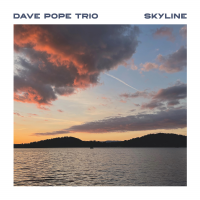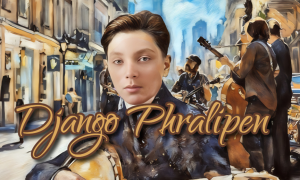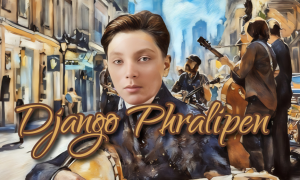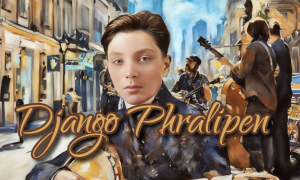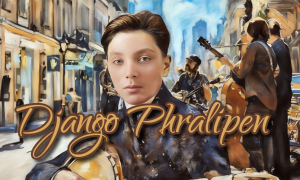Home » Jazz Articles » Django's Cosmic Echo » Chapter Two: The Flood
Chapter Two: The Flood
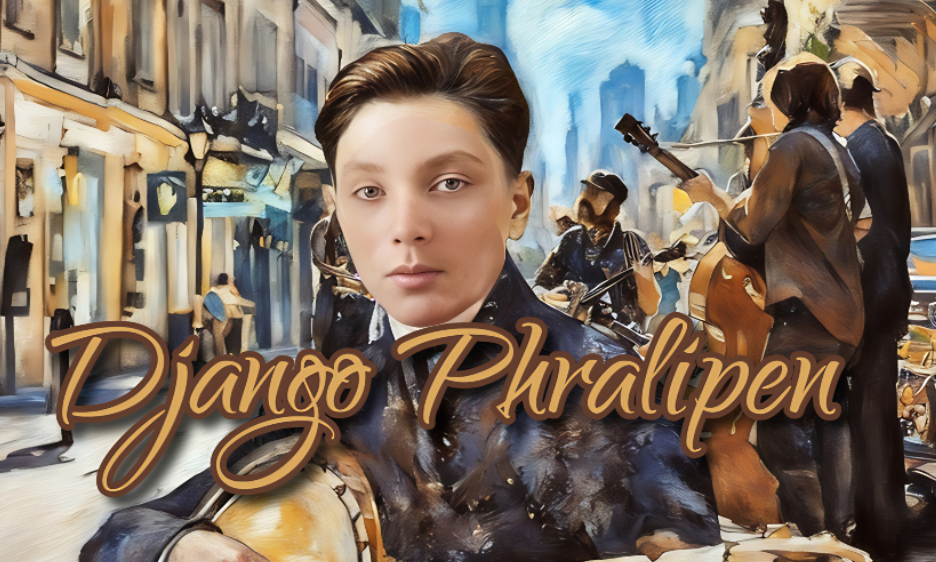
Courtesy AI
Chapters
1 | 2 | 3 | 4 | 5 | 6 | 7 | 8 | 9 | 10 | 11 | 12 | 13 | 14 | 15 | 16 | 17 | 18Initially, his survival instincts had kicked in. As the disorienting shock of this new world sank in, he grew increasingly numb and cautious. The days blurred into weeks, the sheer, unadulterated strangeness of 1967 Amsterdam began to erode Django's hastily constructed defenses. It was a slow, inexorable tide rising around him. Life was a flickering newsreel, images and sounds too fast, too bright. The only real anchor, the one solid piece of ground in the whole shifting landscape, was music. When his fingers found the strings, the buzzing hive of his thoughts—the shock, the fear, the impossible questions—would quiet, just for a while. Music was the translator for a world his seventeen-year-old mind was still struggling to comprehend.
It was a peculiar kind of seesaw he rode. One moment, a dizzying lightness: his left hand, unblemished, a miracle of flesh and bone. He'd somehow leapfrogged a war, a devastation he was only now beginning to grasp from the hushed stories in Dirk's shop and the stark photos in old magazines. He was young, whole, in a world brimming with abundance and possibilities.
Then the seesaw would tip, plunging him into a colder, darker current. The War. The Porajmos. Words he'd never known now carried the weight of a million ghosts. Dirk Bakker, with his quiet voice and sad eyes, would point to passages in books, show him faded photographs. The systematic erasure of his people, the Romani. Hundreds of thousands—the numbers were too vast, too abstract—gone. Sterilizations. Camps with names like barbed wire. A cold dread would settle in his stomach. His family, his Naguine, anyone he'd ever known... if they'd survived, they'd be forty years older, weathered by a history he'd skipped. And the thought, sharp as a shard of glass: even if he found them, what could he possibly say? "It's me, Django... from before." There was no going back.
He was just a kid, really, a Manouche lad trying to wrap his head around four decades of technological leaps—men in space? Talking boxes with moving pictures?—and the crushing weight of a history he hadn't lived but which now defined his people's recent past. Perhaps most difficult of all, he dared not tell a soul. The amnesia story was a thin blanket, but it was all he had.
So he'd drift, often feeling like a boat without a rudder, the currents of 1967 pulling him in a dozen directions at once. Then he'd hear one of his "old" recordings for the first time, spinning on Dirk's turntable. The sound of that guitar, his guitar, played with an impossible dexterity with only two good fingers... it was like a jolt of pure electricity. Awe would wash over him, quickly followed by a fierce, almost giddy realization. If that Django, the one who'd walked through fire, could make music like the heavens opening up, then what could he, with all his fingers and a forty-year head start, accomplish? A slow smile would spread across his face. The world hadn't heard anything yet.
His days found a rhythm between three distinct points. The Commune, a chaotic haven of fanciful ideas, sanctimony, bruised egos, and hope, where the air was thick with incense, laughter and earnest conversation. The Streets, his proving ground, where the clatter of his pick against the strings of a borrowed acoustic cut through the city's hum.
And increasingly, there was Dirk Bakker's Record Shop. It became his sanctuary, his library. Dirk, the old jazz hound, seemed to sense the boy's genuine hunger, not just for music, but for understanding. Django was a sponge, soaking it all in—the rise of bebop, the cool crooners, the raw howl of rock and roll, the British bands that were currently turning the world on its ear. Dirk, happy for the rapt audience, would lend him records, then just start giving them to him, narrating the shifts and turns of the musical landscape like a seasoned guide.
In the commune, jazz often got a polite, slightly distant nod—the music of a bygone era, "their parents' groove." It might have stung, but Django was a practical soul. This, he saw, was the age of the guitar. And when he'd play his own Django Reinhardt records from the past, the Quintette swinging with that undeniable pompe, heads would turn, feet would tap. Even the most dedicated folk purists or rock fans got into it. His music connected. It wasn't the brassy blare of big bands; it was something more intimate, more nimble. That gave him hope.
Dave, the lanky Brit from the park, the one who'd first handed him a guitar in this new world, became a fast friend and eager student. Django, with a patience born of knowing what was possible, began to show him the rhythmic intricacies, the way to lay down that buoyant, driving foundation. Soon, the commune's usual soundtrack of soulful strumming was being punctuated by Django's infectious gypsy swing. He wasn't just replaying his old tunes; he was taking the melodies of this new era—the Beatles' "Honey Pie," Donovan's "Sunshine Superman"—and weaving them into his own unique tapestry, much to the delight of the assembled hippies.
It wasn't long before Django, Dave, and a quiet fellow named Lars, who coaxed subtle, driving rhythms from a single snare drum with a pair of brushes, were causing minor sensations in Vondelpark. These weren't formal gigs, more like spontaneous combustions of music. Django's fingers would fly, Dave would lock into the groove, and Lars would provide the heartbeat. Crowds would gather, drawn by the sound, a vibrant, swirling energy that was pure, acoustic joy.
Dirk Bakker, hearing tales of these impromptu park concerts, came to witness one. He stood on the edge of the crowd, his ever-present pipe unlit, and watched this 'amnesiac' teenager mesmerize a hundred young souls with music that was both impossibly sophisticated and utterly irresistible. A slow realization dawned on the old shopkeeper: this wasn't just talent; this was something else, something... rare.
The weeks turned into a couple of months, a whirlwind of new sounds, new faces, new words. Django's English, picked up from the streets, the commune, and Dirk's rambling discourses, was becoming surprisingly fluent, albeit with a charming Gallic twist. He'd been squirreling away his earnings from passing the hat.
Then, one grey afternoon, scouting the city's music shops with Dirk, he saw it. Tucked away, gleaming softly under a bare bulb, was a used 1957 Gibson ES-175D, complete with its original PAF pickups. It called to him. The price tag made his eyes water, but he had most of it. Dirk, seeing the pure, unadulterated longing in the boy's face—the look of a man finding a lost limb—quietly made up the difference and threw in a small, slightly battered Fender Champ amp he had in the back of his shop.
That evening, as the commune settled into its nightly rhythm of soft chatter and softer substances, Django plugged in the Gibson. The sound that emerged, warm and resonant, filled the room. It was different from his acoustic, richer, with a singing sustain. He'd still use the old Egmond for the streets, for the raw connection. But the Gibson... the Gibson felt like the future. His future, the one he was just starting to tune up.
Story by Alan Bryson, edited and assisted by AI.
Disclaimer: This is a fictional account exploring what might have happened if a temporal quantum event had occurred. While real musicians and historical figures appear within these pages, they exist here in an alternate timeline—a reality that quantum theory suggests was possible, but that never came to pass. All interactions, conversations, and events involving these individuals are entirely fictional, products of a world that exists only in the space between what was and what might have been.
Tags
Comments
PREVIOUS / NEXT
Support All About Jazz
 All About Jazz has been a pillar of jazz since 1995, championing it as an art form and, more importantly, supporting the musicians who make it. Our enduring commitment has made "AAJ" one of the most culturally important websites of its kind, read by hundreds of thousands of fans, musicians and industry figures every month.
All About Jazz has been a pillar of jazz since 1995, championing it as an art form and, more importantly, supporting the musicians who make it. Our enduring commitment has made "AAJ" one of the most culturally important websites of its kind, read by hundreds of thousands of fans, musicians and industry figures every month.




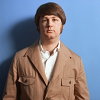

 Buy Now
Buy Now



